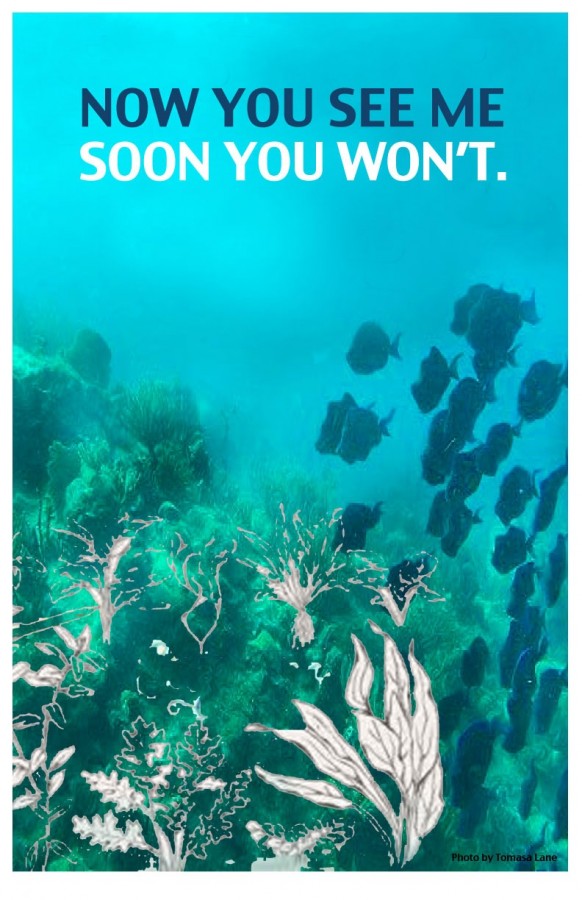Social Issue: Coral Reefs
March 11, 2016
Students in the graphic design art classes have been learning the Adobe suite, which includes Photoshop, InDesign, and Illustrator software. These are all ways to create art via the computers in Regina Dominican’s Mac Lab.
They began the semester with simple projects, but are now at the point where their art can be originally designed. Their current project is to design a poster bringing awareness to a social issue they care about.
The topic of the social issue poster is entirely up to the artist. Topics in the class ranged from encouraging voting to bringing awareness of the Zika Virus and its effect on the upcoming 2016 Rio Olympic Games.
The topic Tomasa Lane ’16 picked is the importance of preserving the coral reefs.
Coral Reefs are underwater ecosystems held together by calcium carbonate. They are built by colonies of tiny animals found in marine waters that usually contain few nutrients.
The reefs are important because they are the most diverse and valuable ecosystems in the world. They support more species per unit area than any other marine environment. According to the National Ocean Service: Education, a division of the National Oceanic and Atmospheric Administration, coral reefs include about 4,000 species of fish, 800 species of corals and hundreds of other species. It is also estimated that there may be another 1 to 8 million undiscovered species of organisms living in reefs.
The reefs also help people by aiding in the development of drugs from coral reef animals and plants which could help with the cure for cancer, arthritis, and other viruses. Coral reefs also provide goods and services worth about $375 billion each year. All of this comes from ecosystems that barely make up 1% of the Earth’s surface.
Humans are impacting the coral reefs—and not in a good way. When more trash is dumped into the ocean, the water becomes less clear or clean. This means the coral reefs must filter the dirty water instead of making more reefs. Global warming is also playing a factor in the coral reefs because when the water temperature gets hotter, the coral reefs die.
However, there is an easy way to help. Leaving shells on the beach where you found them and picking up trash will help coral reefs sustain themselves.
It is also important to share what you know with others, so they will do the same.
Below is a question and answer with Tomasa Lane as she explains her poster and social issue.
Q: Why is this topic important to you?
A: This topic is important to me because the ocean is like a second home to me. I don’t want that to fall apart because of us as a civilization. I want people to know that the ocean is really beautiful, because not a lot of people get a chance to see it. And most importantly, I want everyone who does know how beautiful the ocean is, to know that coral reefs are a crucial part of that ecosystem and we can’t let them disappear.
Q: What are you trying to accomplish with this visual?
A: Because of global warming, the ocean and coral reefs are suffering and I made this poster hoping that I can try to communicate that we need to do something before it’s too late.
Q: What was your inspiration to choose the Coral Reefs as your topic?
A: My inspiration to choose this topic was that I am in love with the ocean. This previous summer, I spent 2 weeks in the Caribbean surrounded by the oceans beauty. I would scuba dive and snorkel many times a day and I would always be so intrigued with everything I saw, especially how important the coral reefs are.
Q: Explain your visual.
The black and white in my poster is the coral reefs. They’re colored like this so I could show them fading out with the “Now you see me, soon you won’t” tagline.


